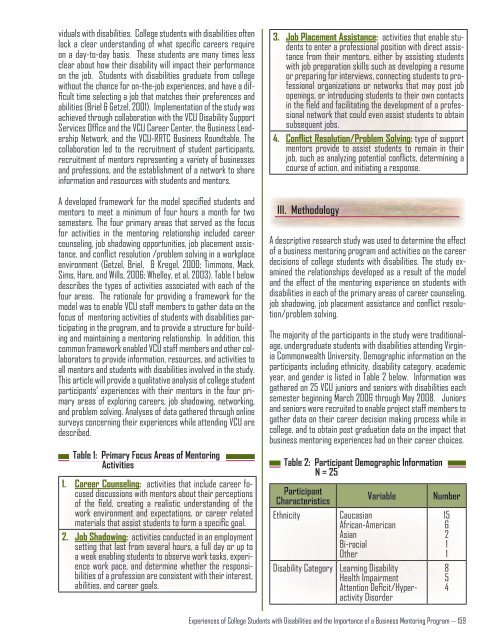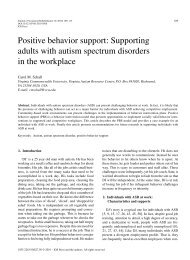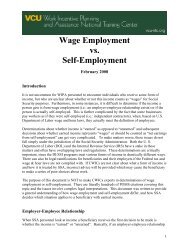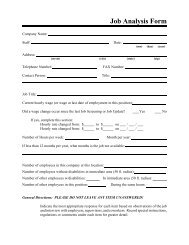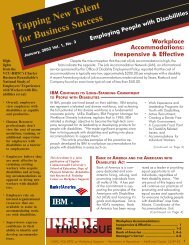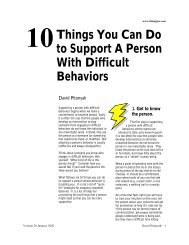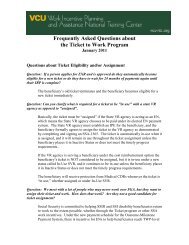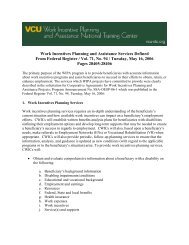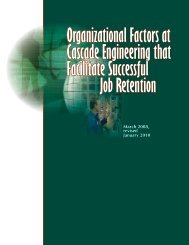E xperiences of College Students with ... - Worksupport.com
E xperiences of College Students with ... - Worksupport.com
E xperiences of College Students with ... - Worksupport.com
You also want an ePaper? Increase the reach of your titles
YUMPU automatically turns print PDFs into web optimized ePapers that Google loves.
viduals <strong>with</strong> disabilities. <strong>College</strong> students <strong>with</strong> disabilities <strong>of</strong>tenlack a clear understanding <strong>of</strong> what specific careers requireon a day-to-day basis. These students are many times lessclear about how their disability will impact their performanceon the job. <strong>Students</strong> <strong>with</strong> disabilities graduate from college<strong>with</strong>out the chance for on-the-job e<strong>xperiences</strong>, and have a difficulttime selecting a job that matches their preferences andabilities (Briel & Getzel, 2001). Implementation <strong>of</strong> the study wasachieved through collaboration <strong>with</strong> the VCU Disability SupportServices Office and the VCU Career Center, the Business LeadershipNetwork, and the VCU-RRTC Business Roundtable. Thecollaboration led to the recruitment <strong>of</strong> student participants,recruitment <strong>of</strong> mentors representing a variety <strong>of</strong> businessesand pr<strong>of</strong>essions, and the establishment <strong>of</strong> a network to shareinformation and resources <strong>with</strong> students and mentors.A developed framework for the model specified students andmentors to meet a minimum <strong>of</strong> four hours a month for twosemesters. The four primary areas that served as the focusfor activities in the mentoring relationship included careercounseling, job shadowing opportunities, job placement assistance,and conflict resolution /problem solving in a workplaceenvironment (Getzel, Briel, & Kregel, 2000; Timmons, Mack,Sims, Hare, and Wills, 2006; Whelley, et al, 2003). Table 1 belowdescribes the types <strong>of</strong> activities associated <strong>with</strong> each <strong>of</strong> thefour areas. The rationale for providing a framework for themodel was to enable VCU staff members to gather data on thefocus <strong>of</strong> mentoring activities <strong>of</strong> students <strong>with</strong> disabilities participatingin the program, and to provide a structure for buildingand maintaining a mentoring relationship. In addition, this<strong>com</strong>mon framework enabled VCU staff members and other collaboratorsto provide information, resources, and activities toall mentors and students <strong>with</strong> disabilities involved in the study.This article will provide a qualitative analysis <strong>of</strong> college studentparticipants’ e<strong>xperiences</strong> <strong>with</strong> their mentors in the four primaryareas <strong>of</strong> exploring careers, job shadowing, networking,and problem solving. Analyses <strong>of</strong> data gathered through onlinesurveys concerning their e<strong>xperiences</strong> while attending VCU aredescribed.Table 1: Primary Focus Areas <strong>of</strong> MentoringActivities1. Career Counseling: activities that include career focuseddiscussions <strong>with</strong> mentors about their perceptions<strong>of</strong> the field, creating a realistic understanding <strong>of</strong> thework environment and expectations, or career relatedmaterials that assist students to form a specific goal.2. Job Shadowing: activities conducted in an employmentsetting that last from several hours, a full day or up toa week enabling students to observe work tasks, experiencework pace, and determine whether the responsibilities<strong>of</strong> a pr<strong>of</strong>ession are consistent <strong>with</strong> their interest,abilities, and career goals.3. Job Placement Assistance: activities that enable studentsto enter a pr<strong>of</strong>essional position <strong>with</strong> direct assistancefrom their mentors, either by assisting students<strong>with</strong> job preparation skills such as developing a resumeor preparing for interviews, connecting students to pr<strong>of</strong>essionalorganizations or networks that may post jobopenings, or introducing students to their own contactsin the field and facilitating the development <strong>of</strong> a pr<strong>of</strong>essionalnetwork that could even assist students to obtainsubsequent jobs.4. Conflict Resolution/Problem Solving: type <strong>of</strong> supportmentors provide to assist students to remain in theirjob, such as analyzing potential conflicts, determining acourse <strong>of</strong> action, and initiating a response.III. MethodologyA descriptive research study was used to determine the effect<strong>of</strong> a business mentoring program and activities on the careerdecisions <strong>of</strong> college students <strong>with</strong> disabilities. The study examinedthe relationships developed as a result <strong>of</strong> the modeland the effect <strong>of</strong> the mentoring experience on students <strong>with</strong>disabilities in each <strong>of</strong> the primary areas <strong>of</strong> career counseling,job shadowing, job placement assistance and conflict resolution/problemsolving.The majority <strong>of</strong> the participants in the study were traditionalage,undergraduate students <strong>with</strong> disabilities attending VirginiaCommonwealth University. Demographic information on theparticipants including ethnicity, disability category, academicyear, and gender is listed in Table 2 below. Information wasgathered on 25 VCU juniors and seniors <strong>with</strong> disabilities eachsemester beginning March 2006 through May 2008. Juniorsand seniors were recruited to enable project staff members togather data on their career decision making process while incollege, and to obtain post graduation data on the impact thatbusiness mentoring e<strong>xperiences</strong> had on their career choices.Table 2: Participant Demographic InformationN = 25ParticipantCharacteristicsEthnicityDisability CategoryVariableCaucasianAfrican-AmericanAsianBi-racialOtherLearning DisabilityHealth ImpairmentAttention Deficit/HyperactivityDisorderNumber156211854E<strong>xperiences</strong> <strong>of</strong> <strong>College</strong> <strong>Students</strong> <strong>with</strong> Disabilities and the Importance <strong>of</strong> a Business Mentoring Program -- 159


